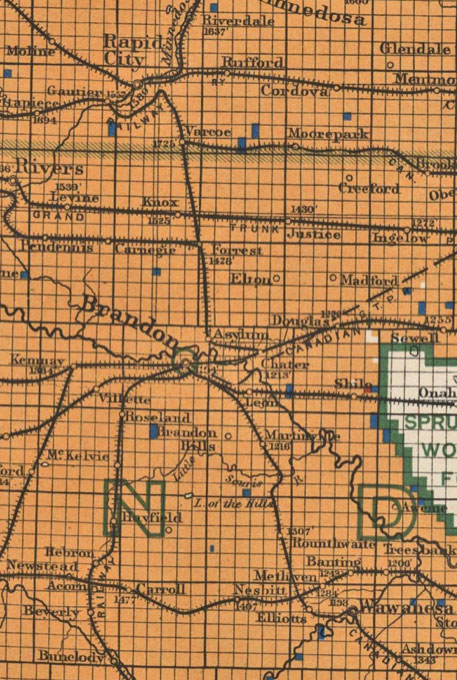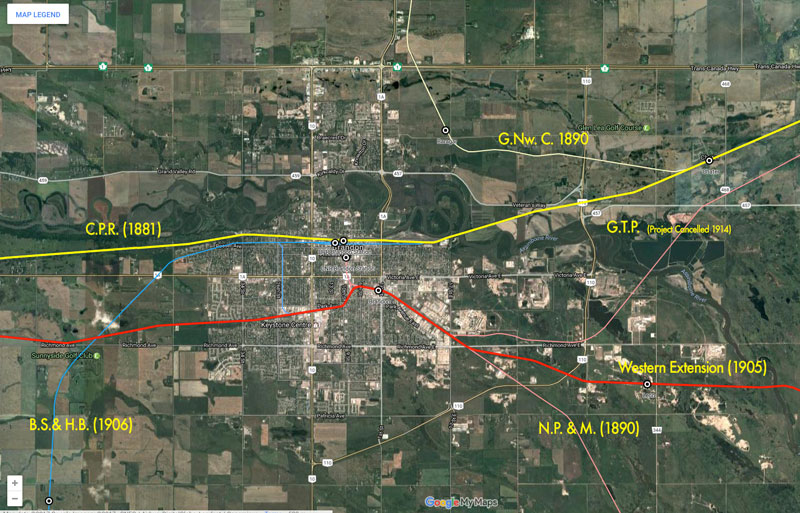 |
 |
 |
| Chapter
9: Expansion: The Railway Boom You can get there from here… 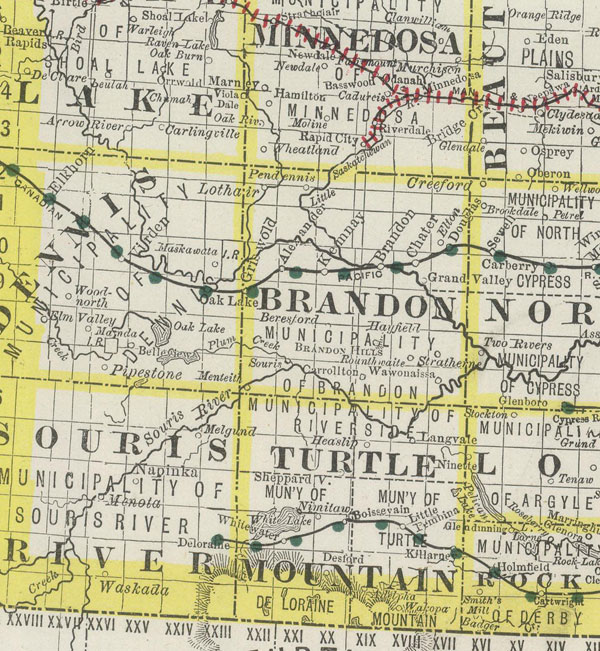 From 1881 until 1890 the CPR was the only viable link between southwestern Manitoba and the rest of the world. Brandon was the hub. Most of the settlers headed for the southwestern corner of the province and beyond, passed through its station, as did most of the building supplies and consumer goods. Virtually all of the farm produce also passed through, on its way east. It had an enormous effect on the new city. Brandon actively sought out additional rail connections with the undisguised aim of consolidating its role as the economic heart) of the region. A Brandon Sun editorial in 1899 stated the case: “The future of this city depends upon securing all the trade that is naturally tributary to us.” Dozens of proposals had been made. Many, such as the Brandon, Souris & Southwestern, the Brandon & Southeastern and the Brandon & Pembina Mountain Railway, as their names imply, had Brandon as the focus. Prior to 1890, none passed the planning stage. In the decade from 1900 to1910, more miles of railway were constructed in Manitoba than in any other similar period. Branch lines were located and built primarily to encourage settlement on the prairies and to transport the agricultural products of these new areas. Northern Pacific & Manitoba In 1890 the Northern Pacific and Manitoba entered the city connecting Brandon to Morris by way of Wawanesa and Baldur. They built a station on Ninth Street just south of Princess Avenue. Passengers could now make connection for Winnipeg at Morris or take a fairly direct route all the way to Duluth Wisconsin. The Canadian Northern, which was chartered in 1899, took over the Northern Pacific and Manitoba line. The line also had a spur from the station to the fairgrounds that operated from 1900 until 1913 In 1908 a 9-stall roundhouse was ready for use on their property near McTavish Avenue and 1st St. The Great Northwest Central In 1890 the Great Northwest Central began a service linking the CPR Main Line at Chater to Hamiota. The track angled up the Assiniboine valley before turning north just a bit east of the old Mental Hospital Grounds where they located a siding called Baragar (or, on some maps… “Asylum”.) 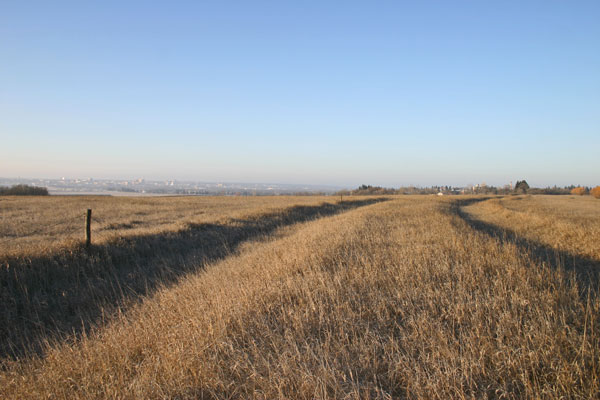 At some later date a short spur was added right in to the Asylum grounds,….the rail bed and tracks are still quite visible today. In 1900 the Great Northwest Central was leased to the CPR and branch lines were extended. CPR Branch To Plum Creek 1890 In the mid 1880’s the CPR was facing increased criticism for not fulfilling its promise to quickly build branch lines. Perhaps the opening of competition had its effect. In 1889 the much delayed branch to Souris and Melita was begun, branching off the main line west of Brandon at Kemnay. By 1891 a second branch from Souris connected to Reston and westward. The Brandon, Saskatchewan and Hudson’s Bay Railway Beginning in 1906, the ambitiously named Brandon, Saskatchewan and Hudson's Bay Railway, a subsidiary of the Great Northern Railway from the U.S., offered service from Brandon to the small town of St. John's, North Dakota where it made connections south to Minneapolis, east to Duluth, and west through Montana to the coast. The line was part of determined efforts by James Hill and the Northern Pacific to take advantage of the Canadian market. 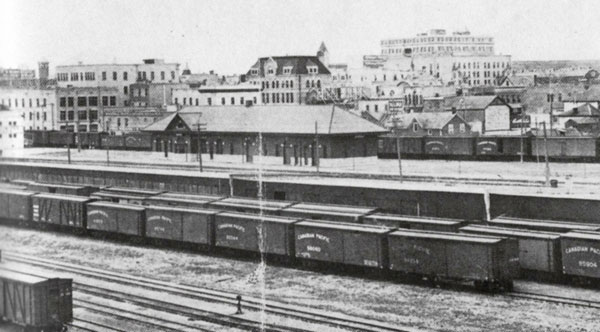 The Brandon GN Station was near 12th and Pacific – just a short distance from the CPR. McKee Archives  The Great Northern contributed substantially to Brandon’s economic makeup. A promotional publication entitled “Brandon in 1913” boasts that ”Brandon has direct connection with the great railway systems of the United States…” and goes on to mention that the railway has a charter to build on to the The Pas and Hudson’s Bay. A newspaper report from 1907 claimed that a line to Winnipeg was being planned. But by the late 20's it was apparent that big profits for the company would never materialize. The line had been built into an area that was already served by east-west lines. The rural population was about to reach its peak and the car was establishing itself as the mode of choice for personal transportation. The Grand Trunk Pacific 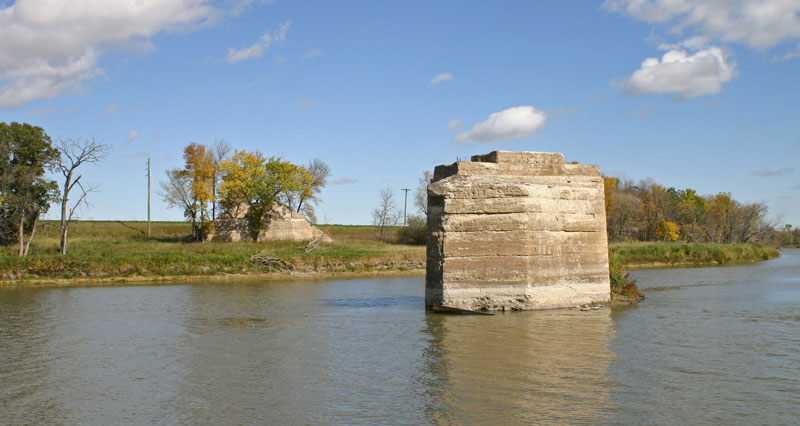 An abandoned railway bridge just east of Brandon, is a visual reminder of one the more interesting examples of the rush to expand rail service and capture the trade. It was much promised…… and almost completed.. The Grand Trunk Pacific had just completed its own transcontinental line, following a route edging northwards from Portage to a divisional point at Rivers and from there northwest, paralleling what is today the Yellowhead Highway, through Edmonton and on the coast. 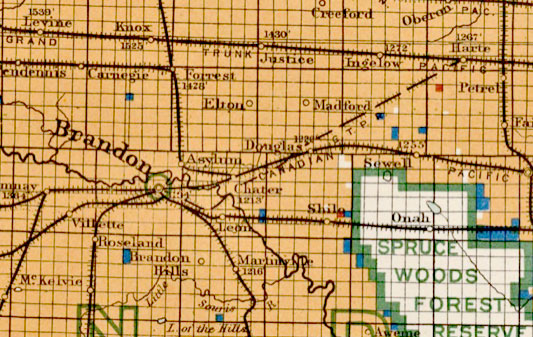 Brandon was promised that a spur would be started within six months of completion of the main line. And it was….started. Work began in 1911. A rail bed was graded from the main line at Harte for nearly 40 km, as far as the Assiniboine River, where a bridge was constructed. It was to intersect with the Canadian Northern line and use the station at the Prince Edward Hotel. But by that time it was becoming apparent that railway companies had overbuilt, and the resulting financial woes intervened. The project was terminated in 1913 leaving only an unfinished rail bed that had never seen rails, let alone trains, and a bridge that was never crossed and had to be demolished in 1924 leaving only these massive supports. The Prince Eddy 1912 saw the building of Brandon’s own (and only) railroad hotel - The Prince Edward - with a station attached. The $500,000 investment in the building of this luxury hotel left no doubt as to Brandon’s status. Lawrence Stuckey, Brandon’s noted railway historian once worked there as a bellhop in 1940 and has left a fine account he calls, “A Touch of Class”. 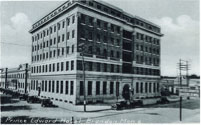 McKee Archives 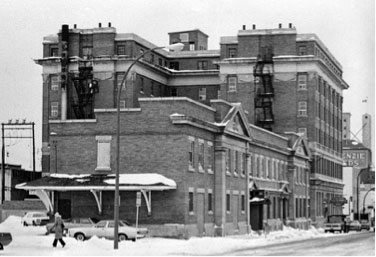 The Red Caboose. a popular nightspot in the early 1970’s was located in the former station, then incorporated as part of the Prince Eddy. |
